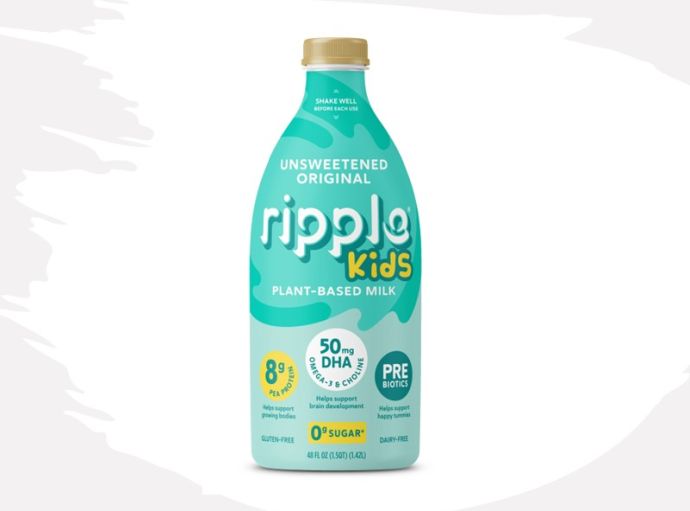Pea milk maker Ripple Foods has raised $49 million in a new round, taking its cumulative funding to more than $274 million.
According to a November 29 SEC filing first reported by Forbes, Berkeley, California-based Ripple Foods has raised $49.2 million from a total offering of $55.4 million via a combination of equity, debt, and securities that can be obtained in the future through the exercise of an option or warrant.
The round follows a $60 million series E in late 2021 led by Rage Capital (now Bloom8), Ajax Strategies, and S2G Ventures; a $55.8 million series D in 2020; a $65 million series C in 2018; a $30 million series B in 2016; and a $13.6 million series A in 2015.
Ripple: More protein, less sugar
Ripple Foods was founded in late 2014 by Amyris cofounder Neil Renninger and Method household products cofounder Adam Lowry, who brought in former PepsiCo and Conagra exec Laura Flanagan to run the business as CEO in 2019, but still sit on the company’s board.
While several firms make milk from yellow peas, Ripple Foods claims to stand out from the crowd by utilizing novel technology that strips out unwanted components (color/flavor) from commercially available plant protein isolates to yield ‘Ripptein,’ a neutral-tasting protein that can be incorporated into foods and beverages in high quantities.
By overcoming the sensory barriers, Ripple Foods has been able to dial up the protein (8g per 8oz serving) and dial down the sugar (6g per 8oz serving) to create an allergen-friendly (soy-, dairy-, nut-free) plant-based milk with half the sugar and 50% more calcium than 2% dairy milk and eight times the protein of almond milk, making it particularly attractive to households with children, claims the company.
The Ripple brand – which launched in early 2016 – is now sold in grocery stores across the US and has extended into protein shakes, kids’ products, and half and half, although not everything it has touched has turned to CPG gold, notably plant-based yogurt and ‘superfood’ milks.
The company did not respond to a request for comment on revenues or profitability, but CEO Laura Flanagan told AgFunderNews that Ripple Foods had had “a very successful year, outpacing category growth as well as all other segments in 2023.”
She added: “Ripple has the highest consumer loyalty in the category . Our Series F raise continues to fuel our momentum, with distribution expansion and blockbuster innovation like Ripple Kids.”
A press release issued in July said Ripple’s kids’ milk with added omega-3s had experienced “explosive growth,” making it “one of the fastest-growing products across all retail channels in the refrigerated plant-based milk category over the past year.”
The evolving US plant-based milk market
According to US retail data from SPINS for the 52 weeks to July 16, 2023, dollar sales of pea milk rose 17.3% year-over-year while unit sales rose 4.1%, outpacing the overall plant-based milk category, which posted a 7% increase in dollar sales and 5.4% drop in unit sales (SPINS: natural and conventional channels combined).
In the 12-weeks to July 16, however, dollar sales of pea milk were down 4.8% with units down 2.8%, while the overall category was down 3.9% in dollars and 4.5% in units.
The only major subsegment delivering growth in units sales over the 12-week period was shelf-stable coconut milk (+28.9%).
For context, unit sales of dairy milk—which have been on a declining trajectory for years despite a brief blip during the pandemic—fell -2.5% in the 12-week period and dropped -2.3% in the trailing 12 months.
In an October 12 note on publicly traded plant-based companies Beyond Meat, Oatly, and SunOpta (which makes plant-based milks for several leading CPG brands and retailers), Mizuho Securities managing director, equity research John Baumgartner said he was more bullish about plant-based milks than plant-based meats.
“For plant-based beverages (PBBs), our survey suggests continued modest growth for the category in net buyers and total distribution points +2% year-over-year in the 12 weeks through September 9, 2023. We believe new occasions will include greater use of PBBs as ingredients in at-home and foodservice applications.”
US retail sales, 12 weeks to July 16, 2023 (% year-over-year growth/decline):
- Dairy milk: Dollar sales -3.6% to $3.248 billion, unit sales -2.5%
- Plant-based milk: Dollar sales -3.9% to $643.9 million, unit sales -4.5%
- Refrigerated: Dollar sales -4.6% to $568.3 million, unit sales -5.8%
- Shelf-stable: Dollar sales +1.8% to $75.6 million, unit sales +4.4%
- #1 – Almond milk: -4.7% to $347.5 million
- #2 – Oat milk: –4.5% to $150.5 million
- #3 – Soy milk: -2.9% to $46 million
- #4 – Coconut milk: +6.8% to $38.3 million
US retail sales, 52 weeks to July 16, 2023 (% year-over-year growth/decline):
- Dairy milk: Dollar sales +4.6% to $14.74 billion, unit sales -2.3%
- Plant-based milk: Dollar sales +7% to $2.84 billion, unit sales -5.4%
- Refrigerated: Dollar sales +6.4% to $2.5 billion, unit sales -6.7%
- Shelf-stable: Dollar sales +12.3% to $320 million, unit sales +3.5%
- #1 – Almond milk: +1.6% to $1.56 billion
- #2 – Oat milk: +17.7% to $660.5 million
- #3 – Soy milk: +4.5% to $202.7 million
- #4 – Coconut milk: +36.5% to $146.5 million
Source: The US retail figures above combine SPINS multi-outlet (MULO) channel data powered by Circana covering food, drug and mass stores; and SPINS natural enhanced channel data, which includes co-ops, associations, independents, and large regional chains, but excludes some key players such as Whole Foods & Trader Joe’s. They do not cover convenience stores or foodservice sales, which are becoming increasingly important for plant-based milk.
Further reading:
NotCo exits refrigerated plant-based milk segment in US, switches focus to shelf-stable





